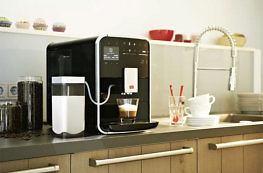The interest in capsule coffee machines is still unabated, which to some extent is due to the advertising of George Clooney. It is estimated that such coffee machines are part of many UK households, and a further increase is to be expected. And there is a good reason for this, because never before has it been possible to make such a great variety of coffees in such short time, for example, espresso, latte macchiato, cappuccino or even normal coffee. As you can see from our selection, there are no major differences between the individual capsule coffee machines. But before you make a decision for a machine, you should first of all have a closer look at the underlying capsule systems. There are numerous different suppliers, but three dominate the market: Nespresso, Nescafé Dolce Gusto and Tassimo.
1. Functional Principle of a Capsule Machine
Unlike conventional filter machines, the coffee is not spoon-filled. Capsule coffee machines belong to the single-serve coffee machines, just like the coffee pod machines. In the case of capsule coffee machines, the coffee is not contained in small pads, but rather in prefabricated capsules. First of all you need to open the device and place the capsule on a mechanism. If the lever is pressed down again, the capsule is pierced and its content can be brewed. Opening the portions can also partly be done via pressure caused by heating, after which the capsule expands until it bursts. The coffee is then mixed with water and brewed.
2. Popular Capsule Systems
An important factor, that should be considered before buying, is the right capsule system. The capsule coffee machines from the various manufacturers are not compatible with each other, so that only proprietary bags, and sometimes those from third-party manufacturers, can be used for a machine. However, the portions of a producer will work with all its capsule machines. It is difficult to say, which system is ultimately the best, because each has its advantages and disadvantages. Below are three of the most popular capsule systems that can be found in this country.
2.1 The Nespresso System
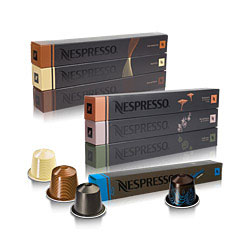
The Nespresso system was the first on the market and very few actually know that their capsules are available since 1986. Just like the Nescafé Dolce Gusto system, Nespresso is sold by Nestlé. It is obtainable in over sixty countries, making it the most widely used and most successful capsule system. Clever marketing and TV commercials with celebrities such as George Clooney helped Nespresso with their success. Compared to Tassimo or Dolce Gusto, the target group for Nespresso is different: the upmarket-style capsules, made from aluminium, are not available in supermarkets but exclusively online and in classy Nespresso boutiques. This Nespresso Club plus the relatively high pricing evoke a certain feeling of holding something very special in your hands. Also, the focus is less on hot beverages based on milk but more on selected coffee and espresso variations. But beverages based on milk can still be had nonetheless, but here conventional milk is used, since many Nespresso machines come with an integrated milk frother. Nespresso machines are priced within the premium segment and are manufactured by Krups and DeLonghi, among others.
Price per Beverage:
- Coffee from £0.35
- Espresso from £0.33
- Milk Drinks from £0.33*
*Milk-based beverages are prepared with espresso capsules plus conventional milk.
2.2 The Dolce Gusto System
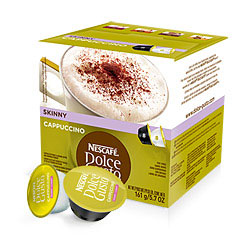
The Nescafé Dolce Gusto system is being distributed by the Swiss food giant Nestlé. It is available since 2005 as well and was jointly developed with Krups. Just like the Tassimo system, the Dolce Gusto capsules are made from synthetic materials and are obtainable in all supermarkets. The selection of hot beverages is similar, there is coffee, tea, cocoa and more. Again, there are extra capsules filled with milk powder for hot beverages based on milk. This machine, however, is also able to produce cold beverages such as iced tea. The machines are of high quality, their look is quite futuristic and they are produced both by Krups and DeLonghi.
Price per Beverage:
- Coffee from £0.28
- Espresso from £0.28
- Cappuccino from £0.56
- Latte Macchiato from £0.56
- Chocolate from £0.56
- Tea from £0.28
2.3 The Tassimo System
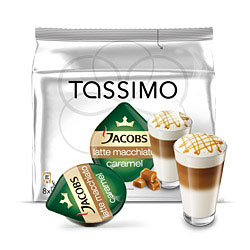
Tassimo is being distributed by the US company Kraft Food (nowadays known as Mondelēz International). Their capsule system exists since 2005 and is available in more than twenty countries by now. The capsules named T DISCs are made from synthetic materials and are obtainable in every supermarket. With these Tassimo T DISCs you can make coffee, but also tea, cocoa and other hot beverages. For the preparation of lattes, or other hot beverages based on milk, you can puchase special T DISCs filled with milk powder. The Tassimo machines themselves come without a milk frother and are manufactured by Bosch. A frequently cited disadvantage, however, is the fact that Tassimo capsules are patented and therefore not available from alternative suppliers.
Price per Beverage:
- Coffee from £0.25
- Espresso from £0.25
- Cappuccino from £0.50
- Latte Macchiato from £0.50
- Chocolate from £0.28
- Tea from £0.25
Notice: The beverage prices have been calculated using the manufacturer’s website and may vary.
3. Important Equipment Details
3.1 Separate Milk Frother
Some capsule machines have an integrated milk frother. It foams the milk until it gets a creamy consistency. Such devices can also be purchased individually, but they cost around 50 pounds, provided they are of good quality. Milk froth is a matter of taste, so if you have not tasted it yet, then you should first try it out in your café and then decide, whether a milk frother is actually necessary.
3.2 Pump Pressure
How strongly the pump works will have an impact on the aroma of the coffee, whereas more pressure means more flavor. However, machines with high values have often shorter brewing durations, which leads to less caffeine in the coffee. The pressure is especially important if espresso is to be produced, because this type of coffee is particularly intense, which is why the pump pressure must be at least 7 bars. However, most devices surpass that by a multiple, and some even work at almost 20 bars.
3.3 Coffee Strength Settings
The flow rate can be modified for most models in order to adjust the coffee or espresso strength. In general, there are usually two variants available in a capsule coffee machine, whereas the first one is designed for small and the second for large cups.
3.4 Height Adjustment
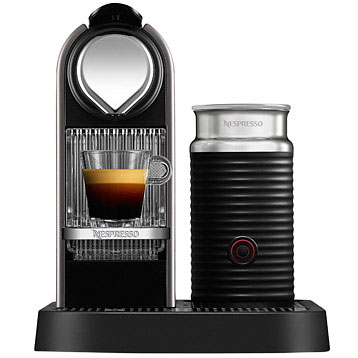
Especially large cups cannot be used on all devices. Only a few models offer the capability to adjust the height of the nozzle from which the coffee flows.
3.5 Measurements of the Machine
If you only have a little space left in the kitchen, then you should buy an accordingly small capsule machine. In general, these are relatively space-saving compared to fully automatic coffee machines.
3.6 Holding Capacity of the Water Tank
You should consider a large water tank, especially if the device is going to supply the entire family with coffee, otherwise you will have to refill after each use. A good value is everything above one liter. If, on the other hand, you only drink coffee once in a while and you live alone, then a smaller tank is probably more advisable. That way the water never stays too long in the tank, which prevents the build-up of germs and bacteria.
3.7 Automatic Switch-off Function
Most people often forget to switch off the device after use. For this purpose, an automatic system is usually installed in most capsule coffee machines, which is activated immediately if no button has been pressed for a few minutes. In addition, some devices have a sensor that detects if a cup is almost overflowing, which stops the brewing process in order to prevent a big mess.
3.8 Dishwasher Safe Parts
Coffee can quickly leave streaks and stains behind. If you have to scrub these by hand from the material, then this is associated with a correspondingly high effort. The detachable parts of most capsule coffee machines are therefore dishwasher safe.
4. Important Manufacturers of Capsule Machines
4.1 DeLonghi
DeLonghi was founded in Italy in 1902 and is headquartered in Treviso. The company initially dealt with handicraft articles and then expanded into the household appliances market. Today it mainly produces coffee machines such as espresso machines, bean to cup coffee machines or capsule coffee machines. The product range is priced from cheap to expensive. The former is definitely implementable by the company, because the items are produced in low-wage countries. Delonghi has currently an annual turnover of around EUR 1.5 billion and employs around 7300 people.

4.2 Krups
Krups was originally a smithery who bought Robert Krups in 1846 and then started to produce scales. The production of coffee grinders did not start until 1956. However, the devices became a mass product just a few years later and Krups was able to sell more than a million copies in just one year. In 1991 the company was taken over by Moulinex, which went bankrupt shortly after. Krups was then purchased by the Groupe SEB, a French manufacturer of electrical appliances, and is still owned by it. Krups is currently producing hand mixer, coffee machines and scales.
4.3 Bosch
Bosch was founded in 1886 and produced car parts and electrical appliances. Nearly fifteen years later, the first factory was founded and in just 5 years over 100,000 ignition magneto were produced for gas engines. Over the years, Bosch has continued to expand and developed important technologies such as the ESP (Electronic Stability Program) or ABS (anti-lock braking system) for vehicles. The clever management and the talented engineers earned the company a tremendous success. Bosch currently employs 370000 people and generates more than 70 billion euros a year.
5. Advertising Figureheads Nespresso
Nespresso spends quite a lot on advertising and since 2006 one of the advertising faces is none other than the huge Hollywood star George Clooney, who has collected around 2 million dollars per second.
A few years ago, his counterpart was the less famous John Malcovich, who played God in the TV commercial where Clooney was slain by a falling piano. God has set its sights on the bag full of Nespresso capsules and promised Clooney that he would revive him as long as he handed him the capsules over. He simply denied it and preferred death.
George Clooney is currently joined by Jack Black. The aging rocker and lead singer of the band Tenacious D appears to be out of place in this world of fine taste and still needs to learn from Clooney, how to behave accordingly.
6. Capsule Machines for Tea – Useful or Not?
A current trend is the brewing of tea in capsule machines. Nestlé and teapot have even developed special tea capsule machines for this purpose that are marketed under the name of Special.T by Nestlé and Teekanne Tealounge. None of these machines are currently included in our top 10.
6.1 Cost Comparison – Tea Bags and Capsules
The cost associated with capsule machines can easily go through the roof, because a conventional package of Yorkshire Tea costs £5.79 including 240 tea bags, which corresponds to a cup price of about 2.4 pence. The Special.T or Tassimo and Dolce Gusto capsules, on the other hand, cost quite a lot, which is shown below.
Price per Beverage:
- Yorkshire: 2.4 pence (£5.79 / 240 tea bags)
- Tassimo: 23 pence (£3.69 / 16 capsules)
- Dolce Gusto: 25 pence (£3.99 / 16 capsules)
- Special.T: 31 pence (£3.11 / 10 capsules)
*The prices are taken from the manufacturer page and are given as an example
Conclusion: Tea from single-serving machines is very costly and thanks to the many capsule remains, also not very environmentally friendly. Even the testers from “Stiftung Warentest” could not detect any differences with regard to taste or smell in Nestlé’s Special.T. If you prefer the tea preparation with the convenient capsule variant and the price does not play a crucial role, can take a closer look at both models.
7. The Environmental Problem of the Capsules
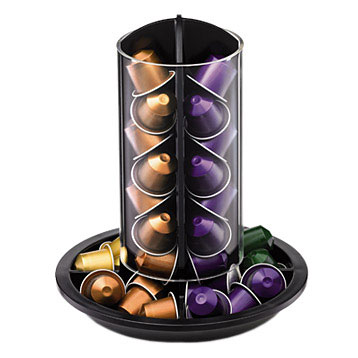
One of the main drawbacks of the capsules is the high environmental impact. Around 2 billion coffee capsules accumulate every year in Germany, because every single portion is packed individually instead of the whole coffee, which corresponds to a waste of more than 4,000 tons. The main problem is that they can hardly be recycled, since substances like plastic or aluminum are usually present. As a result, most of the capsules are simply burned and the exhaust gases pollute the air. Moreover, the production of such capsules requires a great deal of energy and resources.
However, there are also products that can be recycled and are generally less polluting to the environment. If this is a particularly important factor, then you should carefully study the package before you buy it and pay attention to a corresponding note.
8. Frequently Asked Questions (FAQ)
Which Capsule Coffee Machines Are Able to Make Cocoa?
Not all machines are suitable for this purpose. The preparation usually requires a further step in which, besides the cocoa powder, milk is also added. The best way to find out is to look at the packaging or ask a seller if necessary.
Are There Any Capsule Coffee Machines for Babymilk?
With the Babynes system, Nestlé offers indeed the possibility to prepare babymilk. The capsules are adapted to the needs of the little ones and are optimized to a certain age. Thus, the protein content can vary, because the infant requires initially a lot protein and then gradually much less. The capsules are also particularly well protected from bacteria and the milk can be prepared at different temperatures.
How to Decalcify a Capsule Coffee Machine Correctly?
For this purpose, a descaling agent is applied and then rinsed through the machine. You do not necessarily have to use an expensive brand product. In some cases even vinegar or citric acid is sufficient enough. The only important thing is to repeat the procedure several times. The machine must also be freed from the descaling agent by rinsing it with water. This is the basic principle that works with almost all devices. However, this might differ in just small details. You should also read the instruction manual very carefully before cleaning.
Can You Fill the Coffee Capsules Yourself?
As a matter of fact, there are some models on the market, which are made of recyclable plastic parts. These reusable capsules are filled with the coffee and placed it in the machine. In addition, empty capsules are sold which can only be used once. 100 pieces cost just under 10 pounds. This does not generate less waste, but the capsules are generally 50% cheaper, since the filling is done by the user itself.
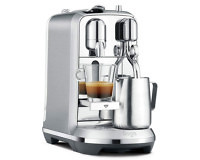
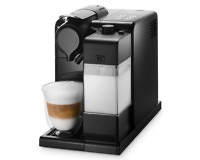
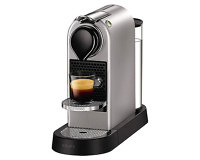
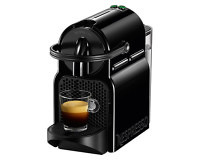
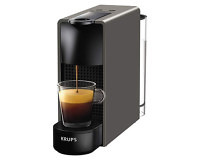
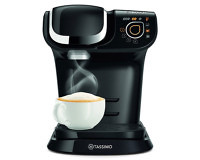
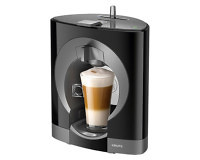
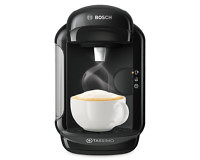
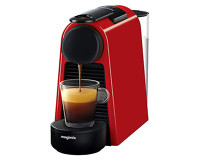
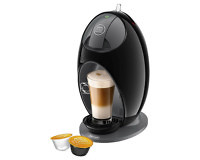
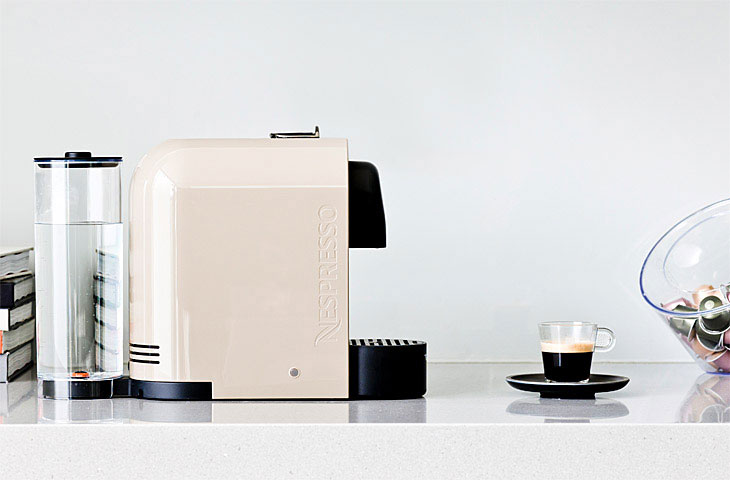

 (36)
(36)
